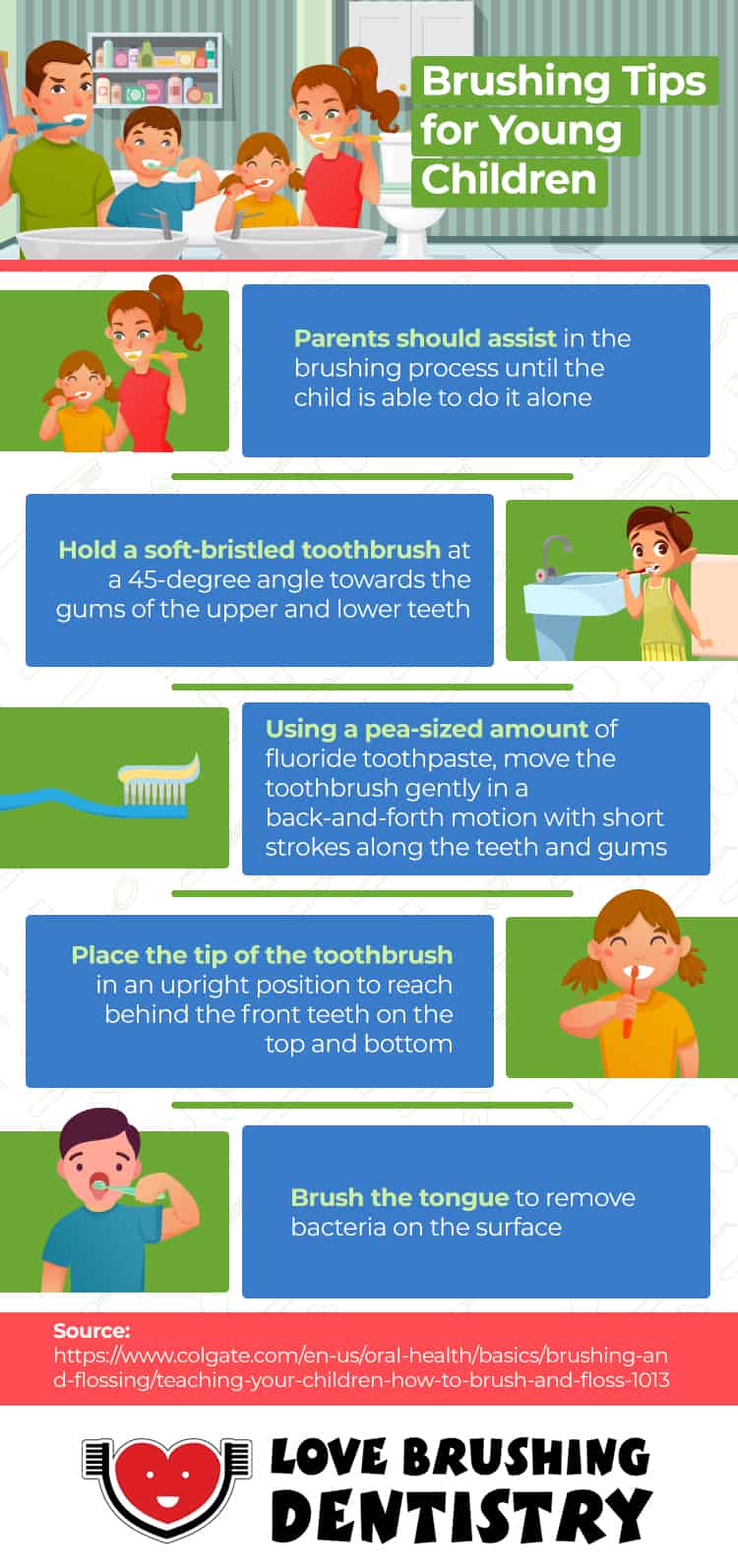Most people have developed poor oral hygiene habits. For example, did you know that you’re supposed to brush your teeth for at least two minutes? Most adults don’t brush anywhere near this length of time.
While this is the most common example of poor habits, it’s not the only one. In many instances, these bad habits develop during childhood, which is why it’s crucial that you teach your children how to brush and floss properly at an early age. Developing good oral hygiene practices will help your children avoid many potentially serious dental health issues down the road.
At Love Brushing Dentistry, we believe that patient education is an important component of the children’s dentistry services we deliver. The following tips will help you teach your children how to brush and floss properly so that they develop good habits while they’re still young.
Brushing Tips
Good oral hygiene should start while your child is still an infant. Clean your baby’s mouth after every feeding. Cradle your baby’s head in one hand and use a clean, wet gauze or cloth to wipe around the mouth. Once your child’s first tooth grows in, you should begin brushing.
The following tips will help ensure your child is brushing properly:
 To brush an infant’s teeth, use a wet, soft-bristled, age-appropriate toothbrush. In most instances, you don’t need to use fluoride toothpaste until your child is one year old.
To brush an infant’s teeth, use a wet, soft-bristled, age-appropriate toothbrush. In most instances, you don’t need to use fluoride toothpaste until your child is one year old.- Make sure you assist your toddler with the brushing process until they feel comfortable brushing on their own. For children under the age of 2, use a very tiny amount of fluoride toothpaste (less than a pea-sized portion). Children should spit out the toothpaste at this age. For children between the ages of 2 and 5, use a pea-sized amount of toothpaste and have them rinse with water after brushing. Always use a soft-bristled toothbrush.
- Make sure your children brush twice a day. Hold the toothbrush at a 45-degree angle towards the gum line and use a gentle, back-and-forth motion with short strokes. Make sure every tooth is brushed in this manner. Brush the tongue in order to eliminate any bacteria growing along its surface.
- If you want, you can use a battery-powered toothbrush with young children. Dr. Khavari will instruct you on the best options for your kids.
- Replace your child’s toothbrush every 3-4 months. If the toothbrush becomes worn out quicker, then you should replace it more frequently. In addition, it’s always a good idea to give your child a new toothbrush after a cold or the flu to prevent those germs from cycling through your child’s body again.
Children age 6 and older should be able to brush without assistance. However, you may want to supervise this process until you are confident they are brushing properly, reaching all areas of their mouth and spending at least two minutes every time they brush.
Flossing Tips
Your child should begin flossing as soon as adjacent tooth surfaces develop. Make sure your child is flossing once a day to ensure food particles between the teeth are removed before plaque develops.
The following tips will ensure your child is flossing properly:
- Use piece of floss that is roughly 18-24 inches in length. Hold it between the thumb and index finger, wrapping the floss around each of these fingers.
- Create a C-shape curve with the floss as your child wraps it around each tooth. Slide the floss up and down gently along the side of each tooth, and make sure to floss underneath the gumline. It’s important that your child isn’t applying too much pressure when flossing.
- Use a different section of floss for each tooth to avoid reintroducing the removed food debris and plaque into other areas of your child’s mouth.
Regular Dental Checkups and Cleanings Are Important
Instilling good brushing and flossing habits while your children are young is an important way to help them maintain healthy teeth and gums. However, this routine should be supplemented with regular dental checkups and cleanings with Dr. Khavari. These visits to our office should begin six months after your child’s first tooth emerges, and no later than age 1.
During these visits, Dr. Khavari will remove any plaque or tartar that has hardened on your children’s teeth, and she will be able to identify any potential oral health issues in their earliest stages to ensure the most conservative treatment options will be effective. By teaching your children proper brushing and flossing habits at an early age and by establishing a routine that includes regular dental cleanings, you can help your children avoid many of the issues that impact people with poor oral hygiene habits.
Contact our East Houston Children’s Dentist
Please contact Love Brushing Dentistry using the form on this page or call 713-490-2088 today to schedule an appointment for your child. We serve children and adults in Pasadena, Channelview, Baytown and throughout East Houston.
